| Srl | Item |
| 1 |
ID:
134097
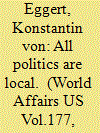

|
|
|
|
|
| Publication |
2014.
|
| Summary/Abstract |
Let us drink to Putin! He is doing so many good things for us." This toast from a friend's mother, at a recent friendly gathering of neighbors at my dacha near Moscow, made a few of us around the table feel a little uneasy. I think it was the first time that I'd heard someone proposing to drink the health of one of our heads of state when it wasn't required by protocol. However, this lady's emotions were sincere and, given the circumstances in Russia today, quite logical. Vladimir Putin's Crimean blitz was a very domestic Russian affair, designed to give the people a new sense of imperial pride and, by extension, provide the Kremlin with a badly needed popularity boost. In this regard, it succeeded beyond expectation. Even the tragedy of Malaysia Airlines Flight 17 did not shake the foundations of the conviction that most Russians hold: their country is a beacon of moral fortitude and spiritual greatness besieged by the Western forces of atheism, permissiveness, and greed.
|
|
|
|
|
|
|
|
|
|
|
|
|
|
|
|
| 2 |
ID:
133552
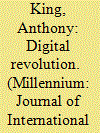

|
|
|
|
|
| Publication |
2014.
|
| Summary/Abstract |
It has been widely acknowledged that military uniforms are significant not only in terms of their practical utility but in terms of their symbolic function. If this is the case, then it is surely noteworthy that in the last ten years there has been a revolution in military uniforms. The disruptive patterns which were the global norm among all military forces in the late twentieth century are in the process of being replaced by new digital patterns. Drawing on the sociology of science and technology, this article explores the development of these uniforms to argue that while neither the scientific research behind digital patterns nor their possible superiority over disruptive designs can be denied, the development of these patterns cannot be seen in purely instrumental or technical terms. Status considerations have been equally important. The paper explores the way in which these new uniforms communicate the new status which professional western forces in the early twenty-first century have been trying to project.
|
|
|
|
|
|
|
|
|
|
|
|
|
|
|
|
| 3 |
ID:
124884
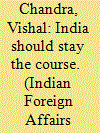

|
|
|
|
|
| Publication |
2013.
|
| Summary/Abstract |
As the Afghan war is far from over, India must take a long-term view of developments in its turbulent north-western neighbourhood. Based on certain assumptions about the likely course of the Afghan war, it is often argued that India may soon have to revisit its policies and priorities in Afghanistan. However, given the constraints and prevailing uncertainty, India may not be in a position to bring about any radical shift in its Afghan policy, at least not in the short-term. The Afghan situation is extremely fragile at the moment in view of the fragmented nature of its polity, overlapping transitions, and strong external dimensions to the conflict, all of which do have a direct impact on India's security and, at the same time, restrict its options.
|
|
|
|
|
|
|
|
|
|
|
|
|
|
|
|
| 4 |
ID:
111038
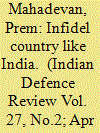

|
|
|
| 5 |
ID:
171197
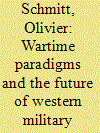

|
|
|
|
|
| Summary/Abstract |
From the perception of the imminence of threats at the political level to the seizing of initiative through proper timing at the tactical level, temporality is directly related to war and warfare. Yet, despite some analyses of the importance of time at the political/grand strategic level (usually by scholars) and at the tactical level (usually by military professionals) there is surprisingly little discussion of the impact of time on the preparation and the conduct of warfare. This article introduces the concept of ‘wartime paradigm’ as a heuristic device to understand the relationship between the perception of time and the conduct of warfare, and argues that after the Cold War, a specific ‘wartime paradigm’ combining an optimization for speed and an understanding of war as risk management has guided western warfare, from force structure to the conduct of actual operations. It shows how the changing character of warfare directly challenges this wartime paradigm and why, if western forces want to prevail in future conflicts, the establishment of a new wartime paradigm guiding technological improvements and operational concepts is critical.
|
|
|
|
|
|
|
|
|
|
|
|
|
|
|
|